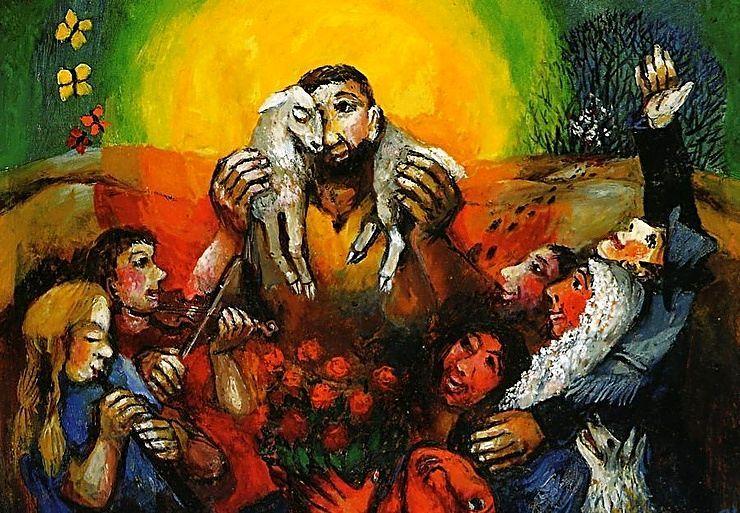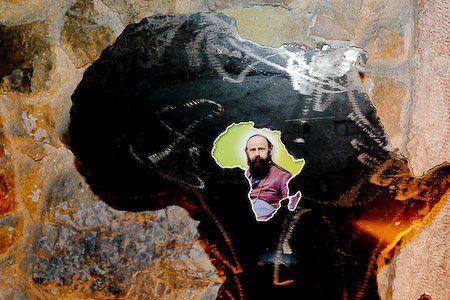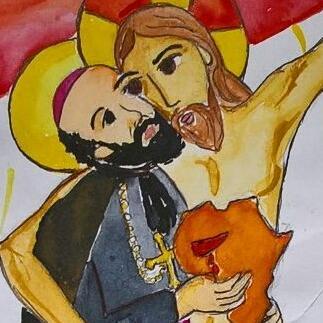Daniel Comboni
Comboni Missionaries
Institutional area
Other links
Newsletter
Then the king will say to those at his right hand, “Come, you who are blessed by my Father, inherit the kingdom prepared for you from the foundation of the world; for I was hungry and you gave me food, I was thirsty and you gave me something to drink, I was a stranger and you welcomed me… (Mt 25,34-35).
Liberation are not new to the Church. From its very beginning and in tune with the message and the actions of Jesus, the first disci-ples understood and tried to give life to very explicit texts such Lk 4,14ff and Mt 25,31-46. In the latter Jesus assumes the very iden-tity of the poor and the less privileged and says explicitly: “What-ever you have done or not done to the least of my brothers and sis-ters, you have done it or not done it to me.”
The option for the poor and for their total liberation is a Gospel option, which has its roots in the most ancient biblical and pastoral tradition of the People of God.
Faithful to this tradition and to the charism and pastoral practice of our Founder, we Comboni Missionaries have constantly renewed our option for them in the last General Chapters and in the current Rule of Life. It could not have been otherwise, because most of us live in places where poverty and exclusion oppress the weak: chil-dren of God who see their last hope in our missionary activity.
The cry of the poor
Our last General Chapter took place in a very special context: the beginning of the Third Millennium and the establishment of glob-alization and of the market economy which many experts consider a true social Darwinism causing, among its most dramatic conse-quences, the emargination and the exclusion of the poorest of the poor. Missionaries from both the North and the South of the world participated in the Chapter. During its various sessions we, Chap-ter delegates as well as the confreres we represented, have often listened to the cry of the poor, the brothers and sisters with whom we live and work.
The activities and reflections of the XVI General Chapter have constantly kept in touch with the voice of the victims, the ex-cluded; of the countless multitudes of human beings whose lives are threatened by a heartless system that causes a premature and violent death of the weakest.
We read in our Chapter Acts (CA 24), “the cry of pain of many peoples of Africa, of the Americas and of Asia continues to place a prophetic question mark over our presence and the quality of our service in these continents.” The poor are deemed, “a special theo-logical locus and the suffering face of Christ” (CA 12).
Liberating evangelization
The Chapter restated what Evangelii Nuntiandi said almost 30 years ago, that “Evangelization is also human promotion” (n. 31ff). It “leads individuals and human groups to attain the fullness of their dignity, liberation from everything that dehumanizes them, and the joy of fraternity, of justice and of peace” (CA 40.1).
This evangelizing (missionary) activity demands that the Comboni Missionary know how to be present and participate in activities of justice and peace, how to be active in mass media, how to support and take part in community projects that will create an alternative economy, which will use tools such as the ethical bank, boycotts and a well informed way of buying consumer goods (CA 29). It also involves him in “an education towards sobriety, voluntary simplicity of life, the ethics of self-limitation - visible signs of an option for a radical way of life and austerity” (CA 27.2).
In this context, the Chapter Acts state categorically that “in a world dominated by neo-liberalism, the economy is one of the sec-tors of life that is least evangelized” (CA 101). For this reason, we Chapter delegates have pledged “to avoid forms of complicity with an economic system that is often responsible for the gravest of injustices” and “to denounce such deadly mechanisms.” The In-stitute, through its members, pledges not to accept the use of fi-nancial means that are not ethically sound (CA 101.3).
Globalization and solidarity
By renewing its option for the poor and against poverty, the Chap-ter tried to answer the call of John Paul II to globalize solidarity. This is how it reads: “Today, more than ever, we feel called to solidarity with the excluded, promoting basic human rights and putting the person, and not profit, at the center of the social pro-ject” (CA 29).
This, in Comboni Missionaries’ terminology, demands that we “know how to be with and for the poor, making common cause with them” (CA 54.4) and “a renewed option for solidarity, shar-ing and hospitality” (CA 27.3).
In this field, Mission Promotion among the People of God is a necessary tool, above all among committed and competent lay people who are able to give the lie to a system that proposes indi-vidual profit as an absolute value, and ignores the central position of the person and of the common good (see CA 101), since, as the Chapter delegates stated: “We are sent to the poorest and most abandoned peoples and human groups: the phenomenon of minori-ties not yet reached by the Church and neglected by society; groups who live on the outer edge of poverty, through historical causes and the negative effects of globalization and the market economy” (CA 36).
The Good News to the poor
A well known statement, attributed to Bishop Hélder Camara, goes like this: “If I give bread to the poor, they call me a saint; if I ask why it is that the poor do not have bread, they call me a com-munist.”
For a long time we missionaries have been dedicated to share the bread, give out clothes, medicines… to build charitable structures, hospitals, schools, churches, to dig wells… and they called us saints. Now we also ask why it is that the poor do not have these goods and, together with them, we work at eliminating structures that create poverty and exclusion. We hope that, for this we will be known as Christians. This is what we are pledged to if we are evangelizers (missionaries) and preachers of good news to the poor.
For community meetings
The word of God
Mt 25, 31-46 - Whatever you will have done to the least of my brothers.
Mk 6, 34-44 - The miracle of the multiplication of bread.
Lk 16, 19-31 - Poor Lazarus and the rich man.
James 2, 1-9 - God has chosen the poor.
For reflection
- To what must we convert and commit ourselves in order to be faithful to the Gospel’s option for the poor?
- Is there any contradiction between words and actions with re-gard to your closeness to the world of the poor?
- What does it mean to opt for the poor and for their liberation?
- What must I do in order that our mission may be truly evangel-izing?
Jorge Oscar García Castillo, mccj
The option for the poor and for their total liberation is a Gospel option, which has its roots in the most ancient biblical and pastoral tradition of the People of God.
Faithful to this tradition and to the charism and pastoral practice of our Founder, we Comboni Missionaries have constantly renewed our option for them in the last General Chapters and in the current Rule of Life. It could not have been otherwise, because most of us live in places where poverty and exclusion oppress the weak: chil-dren of God who see their last hope in our missionary activity.
The cry of the poor
Our last General Chapter took place in a very special context: the beginning of the Third Millennium and the establishment of glob-alization and of the market economy which many experts consider a true social Darwinism causing, among its most dramatic conse-quences, the emargination and the exclusion of the poorest of the poor. Missionaries from both the North and the South of the world participated in the Chapter. During its various sessions we, Chap-ter delegates as well as the confreres we represented, have often listened to the cry of the poor, the brothers and sisters with whom we live and work.
The activities and reflections of the XVI General Chapter have constantly kept in touch with the voice of the victims, the ex-cluded; of the countless multitudes of human beings whose lives are threatened by a heartless system that causes a premature and violent death of the weakest.
We read in our Chapter Acts (CA 24), “the cry of pain of many peoples of Africa, of the Americas and of Asia continues to place a prophetic question mark over our presence and the quality of our service in these continents.” The poor are deemed, “a special theo-logical locus and the suffering face of Christ” (CA 12).
Liberating evangelization
The Chapter restated what Evangelii Nuntiandi said almost 30 years ago, that “Evangelization is also human promotion” (n. 31ff). It “leads individuals and human groups to attain the fullness of their dignity, liberation from everything that dehumanizes them, and the joy of fraternity, of justice and of peace” (CA 40.1).
This evangelizing (missionary) activity demands that the Comboni Missionary know how to be present and participate in activities of justice and peace, how to be active in mass media, how to support and take part in community projects that will create an alternative economy, which will use tools such as the ethical bank, boycotts and a well informed way of buying consumer goods (CA 29). It also involves him in “an education towards sobriety, voluntary simplicity of life, the ethics of self-limitation - visible signs of an option for a radical way of life and austerity” (CA 27.2).
In this context, the Chapter Acts state categorically that “in a world dominated by neo-liberalism, the economy is one of the sec-tors of life that is least evangelized” (CA 101). For this reason, we Chapter delegates have pledged “to avoid forms of complicity with an economic system that is often responsible for the gravest of injustices” and “to denounce such deadly mechanisms.” The In-stitute, through its members, pledges not to accept the use of fi-nancial means that are not ethically sound (CA 101.3).
Globalization and solidarity
By renewing its option for the poor and against poverty, the Chap-ter tried to answer the call of John Paul II to globalize solidarity. This is how it reads: “Today, more than ever, we feel called to solidarity with the excluded, promoting basic human rights and putting the person, and not profit, at the center of the social pro-ject” (CA 29).
This, in Comboni Missionaries’ terminology, demands that we “know how to be with and for the poor, making common cause with them” (CA 54.4) and “a renewed option for solidarity, shar-ing and hospitality” (CA 27.3).
In this field, Mission Promotion among the People of God is a necessary tool, above all among committed and competent lay people who are able to give the lie to a system that proposes indi-vidual profit as an absolute value, and ignores the central position of the person and of the common good (see CA 101), since, as the Chapter delegates stated: “We are sent to the poorest and most abandoned peoples and human groups: the phenomenon of minori-ties not yet reached by the Church and neglected by society; groups who live on the outer edge of poverty, through historical causes and the negative effects of globalization and the market economy” (CA 36).
The Good News to the poor
A well known statement, attributed to Bishop Hélder Camara, goes like this: “If I give bread to the poor, they call me a saint; if I ask why it is that the poor do not have bread, they call me a com-munist.”
For a long time we missionaries have been dedicated to share the bread, give out clothes, medicines… to build charitable structures, hospitals, schools, churches, to dig wells… and they called us saints. Now we also ask why it is that the poor do not have these goods and, together with them, we work at eliminating structures that create poverty and exclusion. We hope that, for this we will be known as Christians. This is what we are pledged to if we are evangelizers (missionaries) and preachers of good news to the poor.
For community meetings
The word of God
Mt 25, 31-46 - Whatever you will have done to the least of my brothers.
Mk 6, 34-44 - The miracle of the multiplication of bread.
Lk 16, 19-31 - Poor Lazarus and the rich man.
James 2, 1-9 - God has chosen the poor.
For reflection
- To what must we convert and commit ourselves in order to be faithful to the Gospel’s option for the poor?
- Is there any contradiction between words and actions with re-gard to your closeness to the world of the poor?
- What does it mean to opt for the poor and for their liberation?
- What must I do in order that our mission may be truly evangel-izing?
Jorge Oscar García Castillo, mccj




